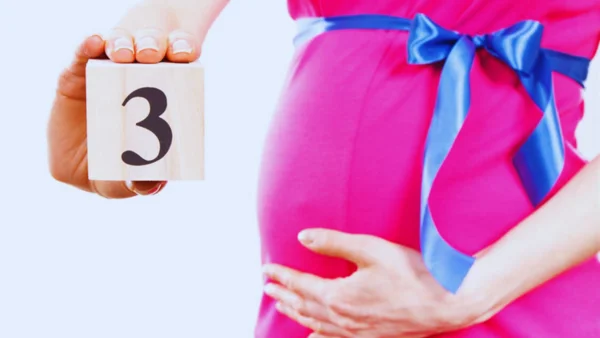What is the first trimester of pregnancy?
How does a pregnant woman take care of herself in the first three months of pregnancy? Pregnancy lasts about 40 weeks. The weeks are divided into three groups.
The first three months are the period between the fertilization of the egg by the sperm (pregnancy) and the end of the twelfth week of pregnancy.
In normal pregnancies, it is not always easy to confirm the exact date of conception. In most cases, the mother may not realize that she is actually pregnant until five or six weeks into the first trimester of pregnancy.
Understanding the stages of pregnancy will help you make informed decisions and prepare well for the big changes that develop from week to week.
Changes that occur to the pregnant woman during the first three months of pregnancy

During the first three months of pregnancy , a woman’s body goes through many changes. The body secretes hormones that affect almost every organ in the body. One of the most prominent signs of pregnancy is the absence of a menstrual period. As the first few weeks pass, some women experience:
- Fatigue and exhaustion.
- Frequent desire to sleep.
- Lower back pain and stomach upset.
- Vomiting.
- Mood swings.
- Breast swelling and increased nipple sensitivity.
- heartburn.
- Weight gain .
- headache.
- Craving for certain foods.
- Disgust with certain foods.
- Disgust with certain perfumes or scents.
- holding.
The following should be considered during the first three months of pregnancy:
The first three months are the most common period for pregnancy loss (miscarriage), so you should follow all the advice and instructions mentioned in this article until the pregnancy is stable.
Therefore, it is best to announce your pregnancy after the first trimester to family, friends and employers. With all the changes that occur in your body during pregnancy, you may wonder what is normal and what is not.
Here are some symptoms that always warrant immediate contact with a doctor:
- Heavy vaginal bleeding.
- Severe abdominal pain.
- sudden thirst
- Painful urination.
- Body temperature above 38.6°C, chills and back pain.
- Severe swelling of hands/face.
- Visual disturbances.
Pregnancy care in the first three months of pregnancy

After confirming your pregnancy, you should make an appointment with your OB/GYN to begin caring for your developing baby. You should also start taking pregnancy vitamins right away.
- Ideally, a woman takes folic acid (a prenatal vitamin) for a year before becoming pregnant.
- In ideal pregnancies, you should visit your doctor once a month during the first three months.
- During the first few visits, your doctor will take a complete health history and perform a complete body and pelvic examination.
The doctor may also:
- Perform an ultrasound to confirm pregnancy.
- Have a Pap test.
- Blood pressure measurement.
- Conduct some laboratory tests to ensure that there are no sexually transmitted diseases, such as HIV.
- Human immunodeficiency virus, hepatitis.
- The expected date of delivery, which is approximately 266 days from the first day of your last menstrual period.
Look for risk factors such as:
- Anemia
- The mother must be young or older than 35 years.
- Weight gain.
- Weight loss .
- Having high blood pressure, diabetes, HIV, cancer, or other autoimmune disorders.
- You are pregnant with twins or more.
- Check thyroid levels.
- Your doctor will perform a test called a nuchal translucency scan, about a month before the end of the first trimester.
- The test uses ultrasound to measure the thickness of the baby’s head and neck.
- The measurements help in early detection of the genetic disease known as Down syndrome.
Measures taken to maintain the health of pregnant women during the first three months of pregnancy
It is important for a mother to be aware of what to do and what to avoid during pregnancy so that she can take care of herself and her developing baby. Here are some good personal hygiene measures to take during the first trimester:
- Take pregnancy vitamins after breakfast with a sufficient amount of water or natural juice.
- Regularly practice exercises suitable for pregnancy, such as: (walking and Kegel exercises to strengthen the pelvic muscles).
- Eat a diet rich in fruits, vegetables, low-fat foods, protein, and fiber.
- Drink plenty of water.
- Eat enough calories (about 300 calories more than usual).
What should pregnant women avoid during the first three months of pregnancy?
These things should be avoided during the first three months:
- Do not do strenuous exercise or strength training that could cause direct injury to the stomach.
- Do not drink alcoholic beverages.
- Do not consume too much caffeine (no more than one cup of coffee or tea per day)
- Quit smoking and avoid passive smoking (stay away from smokers).
- Illegal drugs.
- Do not eat raw fish or smoked seafood, such as: (sushi and fish eggs).
- Do not eat shark, swordfish, mackerel, and white snapper (as they contain high levels of mercury).
- Do not eat uncooked Brussels sprouts or cabbage.
- Avoid cat litter, which can carry a parasitic disease called toxoplasmosis.
- Do not consume unpasteurized milk or other dairy products.
- Avoid cold cuts or sausages.
Developments that occur to the fetus during the first three months
The baby develops rapidly during the first three months. The embryo begins to form:
- Brain and spinal cord.
- Organs begin to form. The baby’s heart will also begin to beat during the first trimester.
- Arms and legs begin to grow in the first few weeks.
- By the end of the eighth week, your fingers and toes will begin to form.
By the end of the first three months of pregnancy, the fetus is fully formed:
- The fetus is 3 inches long and weighs about 1 ounce (31 grams).
- It is possible to determine the sex of the fetus.
- The cartilaginous skeleton begins to transform into solid bone.
- The fetus begins to move and wave.
- The placenta and amniotic sac are complete, and the fetus can also swallow amniotic fluid. Source










